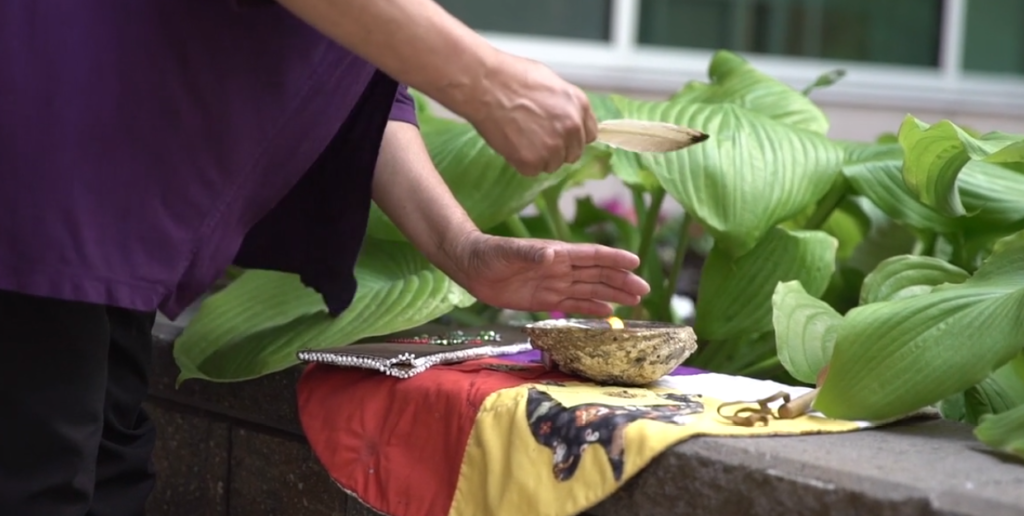
Honouring Smudging at Hamilton Health Sciences
It’s part of our job as a healthcare organization to respect and honour the diverse needs and wishes of our patients. We are always working with patients and families to find new ways to support them in this way. In 2015, the Truth and Reconciliation Commission developed 94 Calls to Action, seven specifically for healthcare organizations. They encourage education on culturally safe practices, and change to policies and programs to repair the harm caused by residential schools, Indian hospitals, and government practices and move forward with reconciliation. It’s our goal to deliver our care in a culturally safe way.
Part of this process is educating our staff on traditional healing practices so they can help to facilitate these experiences when they’re requested.
“True inclusion means that we need to look for ways to deepen our commitment to reconciliation,” says Jane Hastie, Human Rights and Inclusion Specialist at Hamilton Health Sciences (HHS). Sharing information, recognizing and honouring ceremonies and valuing a person’s right to choose how they receive care are important parts of that. We’re aiming to create greater awareness and understanding. We want Indigenous patients to feel safe asking for and practicing their traditional ways.”
In the video below, Barbara VanEvery practices Smudging in the courtyard at Juravinski Hospital and Cancer Centre.
Hastie encourages staff and doctors to be mindful that some Indigenous people may carry important symbols and sacred personal items with them to the hospital. “Always ask before you touch or remove something when providing care. Many indigenous patients will have important personal items like medicine bags, feathers, or other cultural items that hold significant meaning.”
Smudging at Hamilton Health Sciences
Hospital staff and doctors play an important role in reconciliation and engagement. One example of this is the work HHS’ Spiritual Care team does to facilitate Smudging in our hospitals. Smudging is a traditional ceremony practiced by some Indigenous people that involves the burning of sacred herbs. Because of oxygen and ventilation, it isn’t always straightforward to do this in the hospital, but it can be an important healing ritual for some people. Several years ago, a policy was developed to guide Smudging practices in our hospitals.
“True inclusion means that we need to look for ways to deepen our commitment to reconciliation”
As a patient, Barbara VanEvery, knows how important it is for people to be able to practice their culture when they’re in the hospital. She wants front-line staff to know how much it means.
“It’s not scary. Please, try to learn these other cultures because it’s good for us,” she says. “It’s good for the people that are in the hospital and if you want to try to help them, help them by letting them practice their culture.”
Anne Vander Berg, a spiritual care provider at Hamilton Health Sciences, has participated in Smudging ceremonies with patients and recognizes the role that spirituality plays in healing. She encourages all staff to think beyond their own experiences and try to understand the values and needs of their patients.
Becoming aware of spiritual practices
“Not everybody recognizes how important a person’s spirituality is to them,” she says. “Some people identify themselves as not being spiritual or religious, so it’s not necessarily on their radar. But you still can ask a very basic question of families and patients: Do you have spiritual practice or a cultural tradition that is really important to who you are that while you’re here in the hospital, or in the process of treatment, that it would be helpful for us to know about?”
Jane agrees. “We want to honour and value requests for Smudging whether that comes from a family member or patient, and create as best we can, access to space to allow patients to engage in this important healing ceremony,” she says. “Many times patients and families ask our staff to join in on the ceremony. It is an honour to be asked!”
In partnership with our Indigenous community partners, work is underway to enhance the Smudging policy and provide increased education to staff so they are empowered to provide culturally appropriate care.
If a patient or family member asks you about smudging at Hamilton Health Sciences, call paging and request to speak with a spiritual care provider.
